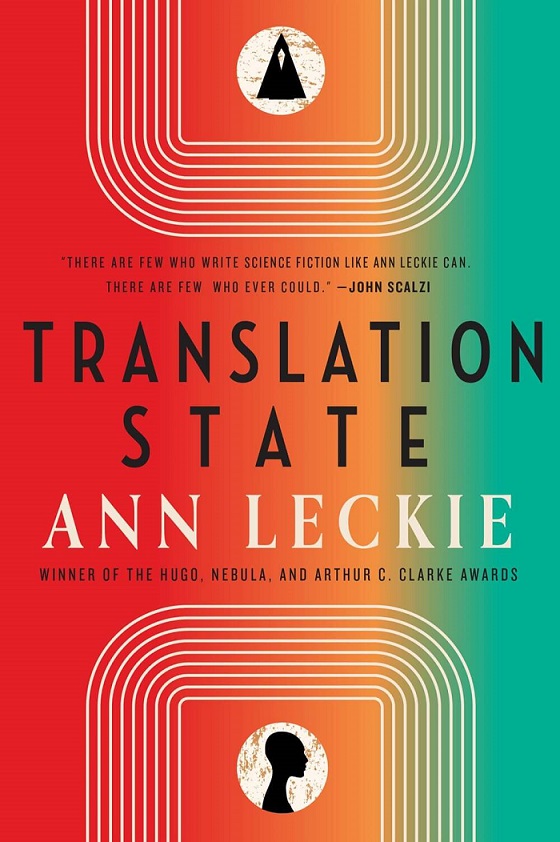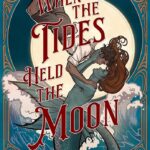
Genres: Queer Protagonists, Sci Fi
Representation: Nonbinary MCs, minor nonbinary characters, queernorm setting
PoV: 1st-person past tense, 3rd-person past tense.
Published on: 6th June 2023
ISBN: B0BH4JGLMC
Goodreads

The mystery of a missing translator sets three lives on a collision course that will have a ripple effect across galaxies in this powerful new novel by one of the masters of modern science fiction. Translation State is at once a sweeping space adventure and a brilliant exploration of how in order to belong, we must first become.
When Enae's grandmaman passes away, Enae inherits something entirely unexpected: a diplomatic assignment to track down a fugitive who has been missing for over 200 years. No one actually expects Enae to succeed; it's an empty assignment meant to keep hir occupied. But Enae has never had a true purpose—no one ever expected hir to do more than care for grandmaman—so sie is determined to accomplish this task to the best of hir ability.
Reet knows nothing about his biological family. He loves his adoptive parents, but has always secretly yearned to understand his identity, the roots that would explain why he seems to operate just a bit differently. After all, no one else hungers to study the world by ripping it apart, by slicing into those around them in order to make sense of things. So when a political group approaches him with the claim that he has ties to a genetically mysterious, long-deceased family, Reet is only too eager to believe them.
Qven was created to be a Presgr translator. The pride of their Clade, they always had a clear path before them: learn human ways, and eventually, make a match and serve as an intermediary between the dangerous alien Presgr and the human worlds. The realization that they might want something different isn't "optimal behavior". It's the type of behavior that will have you eliminated. But Qven rebels anyway, determined to find a way to belong on their own terms.
As a Conclave of the various species approaches—and the long-standing treaty between the humans and the Presgr is on the line—the paths of all three will collide in a chain of events that will have ripple effects across galaxies.
I received this book for free from the publisher via NetGalley in exchange for an honest review. This does not affect my opinion of the book or the content of my review.
Highlights
~are you human if you want to eat people?
~wherein the purchase of a shawl makes me bawl
~always beware conspiracy theorists
~especially when they might bring about the end of the human race
Translation State is the fifth book in Leckie’s Imperial Radch universe, and though you really don’t need to have read the standalone Provenance, I don’t recommend jumping into Translation without having read the original trilogy first. Ancillary Mercy, in particular, provides a lot of context for Translation that you might be a bit lost without. (Although if you have read it, you probably won’t need to reread it before reading this – Translation ought to jog your memory enough just fine.)
As I now definitely expect from Leckie, Translation State is fun; not a quippy thriller-thing, but twisty and thoughtful and in places even kind of cosy. Although the various plotlines have potentially huge implications for all of human space (and non-human space, for that matter) each one is very…peopley, more character-driven than action-driven, quick and deft but also impressively introspective. I mean, it’s Leckie; it is well-established that she can balance plot and introspection beautifully. And just as Breq of the first trilogy is an incredibly interesting being to use as a character – as well as her being an interesting person in her own right – Leckie has set up a wonderful cast here in Translation State.
We open with Enae, whose situation reminded me quite a lot of Halla’s at the opening of T Kingfisher’s Swordheart – except worse. Both Enae and Halla have devoted huge chunks of their lives to taking care of ailing relatives; but it’s pretty clear that Halla’s valued her highly, whereas Enae’s, as becomes clear over the course of the book, was emotionally and verbally abusive, crushing Enae’s spirit to a horrible degree. Seeing hir blossom as sie turns the mind sie’s never really been allowed to use to hir new job was a genuine delight. The Shawl Scene – you’ll know it when you get to it – made me tear up, I was so happy for hir!
Another seriously delightful character is Qven – the only first-person pov in the book. Qven is a Presger Translator – a creation of the terrifying, implacably deadly alien Presger, made to act as a go-between between them and the other sapient species of the universe. The Presger Translators were a big, interesting question-mark in the original trilogy; extremely weird, extremely important, and, honestly, extremely funny. But there’s not really anything funny about poor Qven’s childhood; a whole lot of it is pretty disturbing by human standards (although nothing’s graphic on-page), and after a combination of traumas – one of which can be compared to attempted sexual assault, although really it’s a fair bit worse than that – they’re deemed capital-f Flawed. This is, as you might imagine, very Not Good.
And finally, there’s Reet – a perfectly normal orphan raised by loving parents, drifting through his life but more or less content about it. He’s probably the character I found most relatable – despite the urges to bite people and take them apart. It’s not like he ever acts on it! He just wants to eat his snacks and watch his favourite tv shows – the Murderbot vibes are strong with this one! But when a sort of cultural club offers him answers about his ancestry, he accidentally becomes involved in some very tangled and dangerous politics…
It takes a while for these three to end up in the same space, but I never felt like things were moving too slowly; I enjoyed my time with each character, even before the ‘proper’ plot really got going. I’ll admit, Qven’s parts were definitely the most interesting – Leckie very successfully conveys the extreme Otherness of the Translators, especially the young ones, and as someone who swoons for worldbuilding I wanted to know everything there was to know about what they actually are and how they work. There was a really good balance of disturbing and funny – you want to laugh when you learn how rigidly the Translators adhere to what they’ve been taught is Proper Human Behaviour, like taking tea and making small-talk – and then you learn about…well. Spoilers.
I think most people who’ve read the other books will work out what’s happening pretty quickly, and see the big reveal coming, what the big Thing is that tangles these three characters together. That didn’t ruin anything for me, though. This is much less a what book than it is a why book – which does mean that if you want the action of the Ancillary books, well, you’re not going to find it here. The stakes do get very high, but it never reaches that frenetic, turn-the-pages-as-fast-as-you-can tension I remember from the Ancillary trilogy. I suppose most of the plot takes place in a relatively short timeframe, but it never felt like things were moving especially quickly to me. Not too slow, either! Just, not super fast-paced and packed full of emperors trying to assassinate themselves and whatnot.
The Big Picture story of Translation State is primarily concerned with a question that the Radch carefully never asked the Presger, but which is kind of an ethical must-ask: who, exactly, do the Translators belong to? We know the Presger created them…out of stolen and massacred humans, mixed with bits of the Presger themselves. Does that make them Presger? Does it make them Presger property? Are they human enough to be human, and if so, what obligations do the rest of humanity have to them? Do they have human rights? Should they?
What I really enjoyed about this aspect of the book was that there was no easy answer. Certain biological facts make certain things necessary for Presger Translators, and all the debating and philosophising in the universe can’t change those facts. On the one hand, that does, arguably, make a very large part of the book – which is arguing and debating and philosophising most fiercely – redundant. I can see that being a bit annoying for a certain kind of reader. But I think Leckie does a good enough job at getting you invested enough in the characters that the debate really does matter to you – it did for me, at least. And I was extremely interested in how the debate was affected by the politics of all the different species represented in the Presger Treaty; particularly in how the relationships of the Radch, specifically, to other species tipped the scales in one direction or the other. Like Provenance, Translation State takes place outside of the Radch and follows humans who don’t belong to it, and this is our first time really seeing how much power the Radch hold as it relates to the rest of humanity – and how much the rest of humanity does not necessarily approve of how the Radch represent humanity’s interests to the alien alliance. There were hints of this in Provenance, but it’s much more explored here.
Basically, Translation State was a pretty fun, interesting, thinky read. …Or at least, the first 2/3s (or maybe 3/4s?) was. But the last bit of the book was a major letdown in several ways.
Translation State presents itself primarily as an exploration of the Translators; their culture, their roles, even their biology. And we do learn more about them than we did before this book. But frustratingly, the Big Mysteries that are held over the reader’s head for the entirety of Translation State are never properly explained. Adult Translators try to explain the Presger to Qven, for example, but give up after a few tantilising hints, insisting that only an adult Translator has a hope of understanding. And that explanation never comes to the reader. Which felt very much like having a piece of cake dangled in front of my face for 400+ pages, and then it being whisked away at the last second rather than put on my plate. It was frustrating as hell.
Much, much worse was the incredibly weak resolution of the biggest, most immediate and personal issue for two of the main characters. I was genuinely surprised that this huge thing – the most time-sensitive plot, with the highest personal stakes for the two characters involved – ended up being resolved off-page. After a whole novel leading up to it, I took it for granted that we would see at least the beginning of that resolution, even if it would probably be a fade-to-black scene. (It’s not romantic or sexual, but an allosexual romantic plotline makes a good comparison; after a whole book of will-they-won’t-they, you’d expect to see them kiss on-page, wouldn’t you? If you turned the page, found a bit of a time-skip, and were told the kiss happened where you couldn’t see, that would be a bit of a let-down, wouldn’t it? And this is a much bigger deal than a first kiss, or full-on sex, which can, after all, be completely devoid of meaning depending on the people involved and their relationship to each other. This is a Huge Lifechanging Forever Thing, and after all that build-up…) So for the book to instead skip over it, handwave it, call it all wrapped up and finished so blithely – I was pretty upset, to be honest. And I have no idea why the decision was made to keep it off-page. I have no doubt in my mind Leckie could have written it, and done it very well. So…the hell?
A more minor gripe: I have zero interest in following characters who are lost in mazes or death-traps or cursed temples – any kind of plotline that means we have to watch the cast go round and round trying to find their way out bores me to tears. (Even if it’s a scenario where a wrong step means death. Sorry, it’s just not my thing.) And a big chunk of the ending was made up of just that. It was extremely random, and felt like a really lazy way to stall everything as an excuse to eat up the time that would bring us to the catalyst point for two of the characters. I can think of half-a-dozen other ways Leckie could have used that page-count to tick the boxes that needed ticking, ways that wouldn’t have had us on the pause button for way too many pages.
Just. What???
So I’m pretty conflicted. On the one hand, Translation State is extremely readable, and I found most of it to be a really great story that I didn’t want to put down. On the other hand, several aspects of the last chunk of the book massively disappointed me.
Thus, I’m splitting the difference and calling it a 3 (and a half)-star book – and I suggest that anyone who wants to read Translation State borrow a library copy rather than buying their own. You can always buy a copy to keep afterwards if it turns out you love it.






Good review. I didn’t mind the maze elements and also didn’t mind the off staging of the matching but I did experience the prose of the last quarter becoming YA, which may be a side effect of focusing on YA emotions while not grappling with all the issues raised earlier. Until then, this was a fabulous novel for me.
Pretty much the same as me, then – I LOVED it right up until the last quarter. Still going to pounce on anything Leckie writes, though!